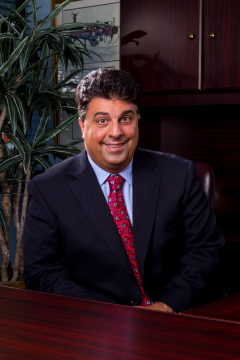Jamaica’s most significant indigenous distributor of petroleum products Joe Issa has said that United States President Donald Trump’s signed proclamation to impose a 10% and 25% tariff on imported aluminium and steel, respectively, could hurt the Jamaican economy, even though the island does not export the metals to the US.

United States President Donald Trump
In an interview, first on the significance of the move by the US to protect its local aluminium industry, Issa clarified that Jamaica is an exporter of alumina, not aluminium or aluminium as the US spells it.
“At the beginning, we used just to ship the bauxite, but now we have some five processing plants to add value to it by producing alumina which we export to the United States where it is processed into pure aluminium. So, since we do not produce aluminium here and, therefore, do not export it, any tariff on imported aluminium into the US will not affect our alumina exports to the US.
“There’s even an outside chance that Jamaica could benefit from the new tax on aluminium imports into the US if it discourages imports and instead encourages more local production, which could increase the demand for Jamaica’s alumina.
“The other scenario is, given that the new tariff will feed into the production cost of aluminium products made in the US, firms may find it more profitable to produce the products outside the US and then export them without attracting the import tax on landing in the US.
“This scenario could be the real deal for Jamaica, in light of the proposed construction of a $6-billion Industrial Park and Special Economic Zone (SEZ) around the alumina plant in Nain, St Elizabeth which aims to move Jamaica from exporting raw materials to developing value-added manufacturing and fabrication industries.
“That deal could be even sweeter if we could produce aluminium here, but that has long been ruled out as unfeasible because of the vast amount of electrical energy needed to power a smelting plant.
“Notwithstanding, since Jamaica imports many goods that are made out of aluminium, as well as those in which some aluminium is used, we can expect to see an increase in the price of these imported goods from the US when they land in Jamaica; so we here will be indirectly impacted through higher cost of imports.
“But countries which produce aluminium for export to the US would positively be affected directly, as the new import tax will make their aluminium more expensive when it lands there, which could reduce the demand for their aluminium and cause them to take countermeasures, in a possible trade war which could ensue.
“In the US, the Trump tariff proposal could be seen as a blow to its local industries, which the President was so eager to protect when he offered the recent tax break, as well as a blow to its European and other allies which export aluminium to the US,” Issa said.
Issa, who is an economics major from the London School of Economics (LSE) in the United Kingdom, added: “At least the possible trade war will not include the US’ closest neighbours – Canada and Mexico – as they have been excluded from the tariff on both aluminium and steel.
Regarding the impact on Jamaica, as far as the tariff on imported steel is concerned, Issa said, “Our construction industry could be impacted through higher cost of imported steel from the US…the business community as well as individuals will pay more to build.
However, Issa is not alone on the impact of Trump’s tariff proposal on US firms. Here’s what Yahoo News wrote: In a rare break with the White House, Republican House Speaker Paul Ryan came out Monday against President Trump’s proposed tariffs on steel and aluminium imports. Ryan’s office warned that the punitive measures could spark a “trade war” that undermines benefits from the GOP’s recent tax overhaul.
It quoted Ryan’s spokeswoman AshLee Strong as saying, “We are extremely worried about the consequences of a trade war and are urging the White House to not advance with this plan…The new tax reform law has boosted the economy, and we certainly don’t want to jeopardise those gains.”
It cited a GOP source who said that Republican congressional leaders “won’t rule out potential action down the line.” It said the source declined to flesh out what kind of response could be in the making, saying, “We are focused on convincing him not to do the tariffs in the first place.”
Apparently, Article I, Section 8 of the US Constitution gives Congress the power to “regulate Commerce with foreign Nations” and “to lay and collect Taxes, Duties, Imposts and Excises.” However, in practice, lawmakers have granted the president broad powers to manage the trade. It is unclear whether the political appetite exists in Congress to take any meaningful action, said Yahoo News.






